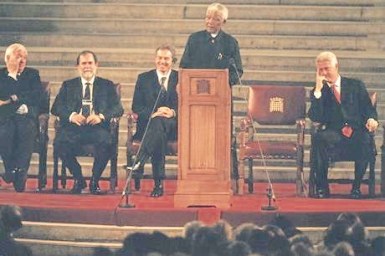Although Nelson Mandela (1918-2013) and Cecil Rhodes (1853-1902) were not contemporaries, they both played important roles in South African history. Mandela, of course, survived imprisonment for nearly 27 years for his struggle against the apartheid regime in that country to become its president and a world-renowned figure. Rhodes was an Englishman who earned a fortune from mining diamonds (De Beers Consolidated Mines) in that country and neighboring Zimbabwe (f/k/a Rhodesia) and who served as Prime Minister in the Cape Colony. In 1903 his will established the Rhodes Scholarships at Oxford University in England.
On the centennial of those Scholarships, Mandela established an indirect connection with Rhodes. His Nelson Mandela Foundation and The Rhodes Trust created a joint venture called the Mandela Rhodes Foundation, whose “central purpose . . . is to build exceptional leadership capacity in Africa.” It does so by operating “a Scholarships and Leadership Development programme . . . [f]ocusing on the four principles of the Foundation: Reconciliation, Education, Entrepreneurship and Leadership. It selects “young leaders from 25 different African countries . . . [to make] inward and outward journeys of self-discovery . . .[to create] community across differences, and . . . [to grow and learn] more about Africa, its peoples and . . . [to make a] contribution towards the development of the continent.”
Mandela’s Speech[1]
To mark this historic joint venture, Mandela addressed a gathering of Rhodes Scholars and dignitaries at Westminster Hall in London on July 2, 2003. Below is a photograph of his making that speech.
He said his objective in so doing was “to close the circle” by letting “our peoples, the ones formerly poor citizens and the others good patricians – politicians, business people, educators, health workers, scientists, engineers and technicians, sports people and entertainers, activists for charitable relief – join hands to build on what we have achieved together and help construct a humane African world, whose emergence will say a new universal order is born in which we are each our brother’s keeper.” This will be “a partnership for freedom, peace, prosperity and friendship.”
Mandela also trusted that this joint venture was for “the labourer who toils on the African farm, fighting for a life of dignity; the girl child battling against great odds for an opportunity to realize her potential; the poor AIDS orphan bereft of family or care; the rural poor eking out a subsistence, deprived of the most basic services and facilities.”
Rhodes, he said, was “that great entrepreneur, [who] made most of the money [in South Africa] which he left in legacy for scholars from across the world to benefit from for the past hundred years. It speaks of a growing sense of global responsibility that in this second century of its operations the Rhodes Trust finds it appropriate to redirect some of its attention and resources back to the origin of that wealth. We can only imagine how Rhodes himself would have identified with this decision to develop human capacity in modern day South Africa, enabling that country to continue being a competitive presence in the world as it was in those fields within which he operated during his times.”
Mandela closed his speech with this quotation from the preamble of the South African Constitution: “”We, the people of South Africa, Recognise the injustices of our past, Honour those who suffered for justice and freedom in our land, Respect those who have worked to build and develop our country; and, Believe that South Africa belongs to all who live in it, united in our diversity.” (Emphasis added.)
Other Participants in the Celebration
This blogger was present on this occasion in London’s Westminster Hall, and a prior post recounts the other remarks by Lord Waldegrave, the Chairman of the Rhodes Trustees; “Nicky” Oppenheimer, the Chairman of DeBeers, the diamond mining company started by Rhodes in South Africa; Bill Clinton, the former U.S. President; and Tony Blair, then the Prime Minister of the U.K.
Most memorably when all the speeches were finished, everyone on the speakers’ stage walked the over 200-feet length of the hall through the audience. Mandela, then nearly 85 years old, and frail, was aided in making the long walk; his right arm was held by Tony Blair; his left, by Bill Clinton. They brought tears to our eyes as they passed six feet from us on their journey through the Hall. Below are photographs of the three men during their walk and of the Hall (with a different audience).

Conclusion
The Mandela Foundation’s decision to establish a joint venture with the trust created by a white Englishman who made a fortune in South Africa illustrates, I think, at least two of Mandela’s principles that are discussed in “Mandela’s Way: Lessons on Life, Love, and Courage” by Richard Stengel: “See the Good in Others” because “no one is only good or evil and no one is evil at heart” and ” Have Core Principle–All Else Is Tactics.”[2]
As noted in another post, the world this year rightfully commemorates the centennial of the birth of Nelson Mandela and his Foundation’s website lists events around the world to commemorate this occasion. (That post also discusses Mandela’s being inspired by Fidel Castro and the Cuban Revolution.)
==============================================
[1] Mandela, Address at sitting of joint houses of Parliament, Westminster in celebration of 100 years of Rhodes Scholars (July 2, 2003).
[2] Stengel, Mandela’s Way: Lessons for an Uncertain Age, Chaps. 6, 7 (Broadway Books, New York, 2010, 2018).
